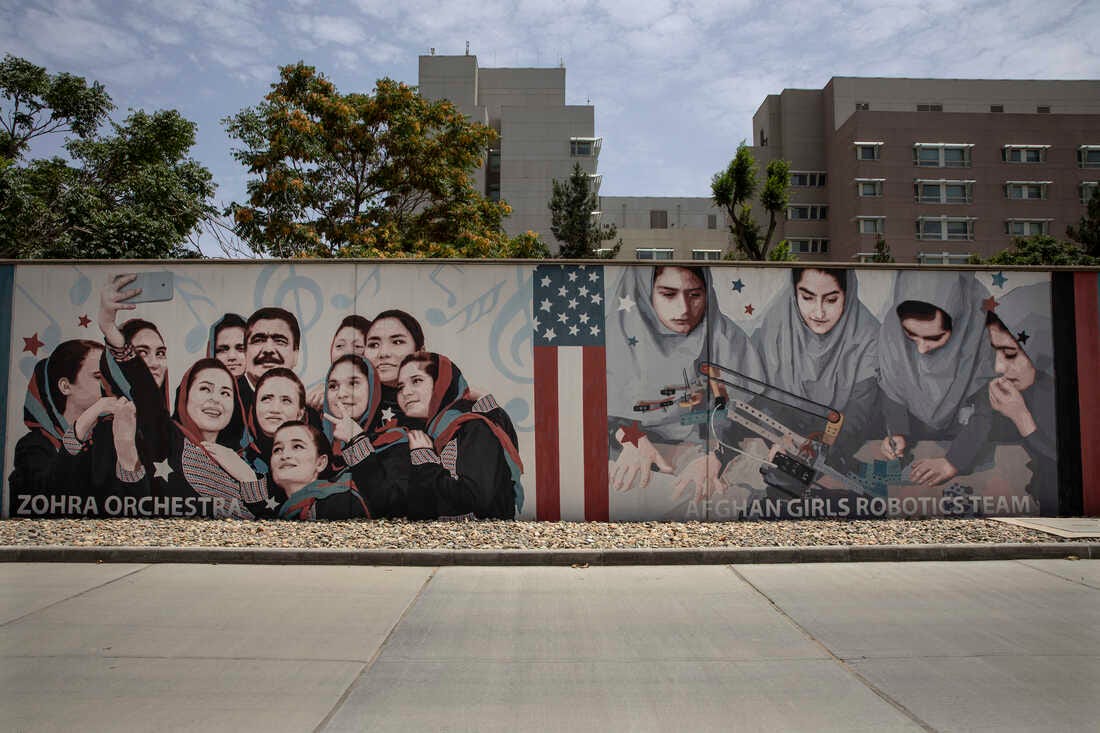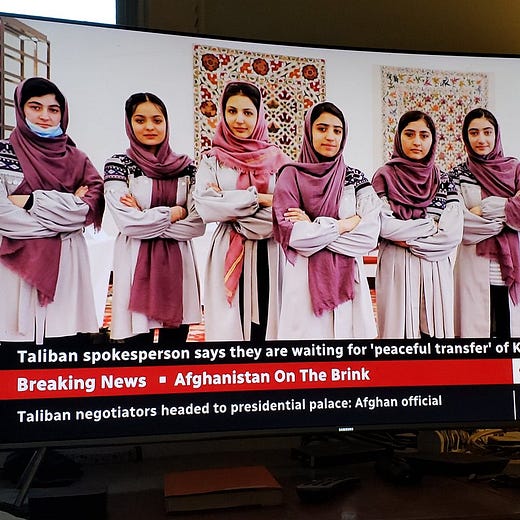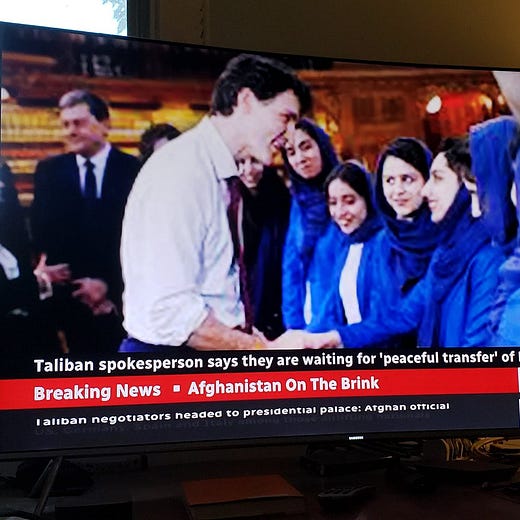It's not subtle
When the performative turns into complete indifference
Some things aren’t subtle.
Like how we celebrated that Afghan girl robotics team over the years.
They traveled abroad many times, making friends and getting headlines.
Even when the blanket ban on people from many Muslim countries was in place, Trump personally intervened to allow them to travel to the United States—though their visas remain rejected.
The U.S. won't say why the girls were rejected for visas, citing confidentiality. But Mohib said that based on discussions with U.S. officials, it appears the girls were rebuffed due to concerns they would not return to Afghanistan. It's a fate that has beset many Afghans seeking entry to the U.S. in recent years as continuing violence and economic challenges lead many to seek asylum in America, or to travel through the U.S. to Canada to try to resettle there.
As their case gained attention, Trump intervened by asking National Security Council officials to find a way for them to travel, officials said. Ultimately the State Department, which adjudicates visa applications, asked the Homeland Security Department to let them in on "parole," a temporary status used only in exceptional circumstances to let in someone who is otherwise ineligible to enter the country. The U.S. granted parole after determining that it constituted a "significant public benefit."
We painted a mural of them on the public facing outer walls of the US embassy in Kabul.
They met with prime ministers.
And now, they’re trapped in Herat.
Their advocates have been begging for help, so far to no avail.
Some can’t even be reached anymore.
Before anyone says it: yes, of course, they were always treated as symbols. They were tokenized, and turned into convenient feel good stories which got recycled around our buzzwords and concerns.
When the pandemic hit, they got publicity for working on a low-cost ventilator.
Before it was their robotics work. They were the counterpart to those viral Boston Dynamics videos, I suppose.
Feel bad, feel good, keep scrolling.
No doubt they were smart and hard-working, like many other girls around the world, and also no doubt they deserved basic rights even if they were just ordinary kids.
And no, saving them—just about 20 girls—will not magically solve Afghanistan’s problems, which do not lend themselves to easy or wishful thinking.
As I wrote in my last post, I did not think military intervention in Iraq or Afghanistan was a good idea.
I don’t mean why didn’t we stay longer. I was deeply opposed to our occupation of Iraq and also Afghanistan, not because I’ve any delusions about what’s going on there anyway, but because it’s clear that any prolonged US military presence would make things worse in both places because that’s what military occupations by superior foreign powers do.
What I mean [is that] we didn’t do the minimally decent thing to help get a few of these people out of the country by putting them on planes for the preceding many months during which we could have done easily this—it would have been slightly politically inconvenient because nobody wants them is the honest truth.
I know the reality of global politics. It’s August and this could all easily be forgotten in US domestic politics in about a month as well (after a short news cycle around the 20th anniversary of the 9/11 tragedy).
As an immigrant myself, I’ll go first and concede that immigration is a difficult process, and those “refugees welcome” signs one sees in many liberal neighborhoods are not worth that much in reality.
Mass migration at scale is a very very fraught process, and even with a lot of resources and goodwill, it can be destabilizing and difficult for everyone touched by it, even if, at times, it is an option of last resort.
Still, there are things worse than a world of superficial and performative caring: it’s dropping even the pretense of it, even for that few, even after that much publicity before.
As I said, some things aren’t subtle.











The idea of a meritocratic version of migration always bothered me. Like when Trump called developing nations "shithole countries," a quick defense was "hey, a lot of app developers immigrated from these countries!"
As if the mean words are the issue, and not the cruel exclusionary policies that have us ranking people by how much they "deserve" to come to the US based on their ability to make other people money.
The Afghan Robotics team was a similar issue. Of course they deserve to be celebrated for their accomplishments, but holding them up as the "good ones" and focusing specifically on their fate so that we can feel better about ourselves always rubbed me the wrong way.
Then again, if the alternative is to just ignore *everyone* including them, I suppose tokenism is the lesser of two evils.
Thank you for writing this piece. One of my acquaintances worked with Afghani women. She is in tears. I am in tears. And I am angry. When I looked at the picture of all the Afghani people packed into the military jet that took off, I saw only a few women and children in the picture. Women are at most risk here. Why weren’t they the ones on this plane? Because caring about the plight of Afghani women and children has never really mattered to politicians. Power brokers ignored it before we invaded Afghanistan, used it to win propaganda points during the occupation, and ignore it again now that we have left. I have no doubt the plight of these women will be used as propaganda talking points by the West when it becomes convenient to do so.